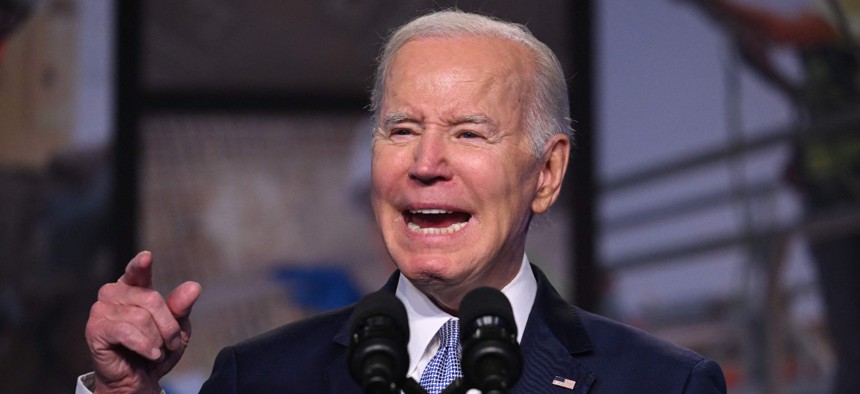
President Biden speaks about the creation of new manufacturing jobs at the Washington Hilton on April 25. JIM WATSON/AFP via Getty Images
Here's How the Hatch Act Applies, With Biden Running for President Again
The Hatch Act limits the political activity of federal employees while on the job.
Now that President Biden is running for reelection, the agency that oversees civil service law released updated guidance on how federal employees can avoid violating the Hatch Act.
The act limits the political activity––meaning activity directed at the success or failure of a political party, partisan political group or candidate for partisan political office––of civilian federal employees while on duty or in a federal building. “This prohibition is broad and encompasses more than displays or communications (including in-person and via email or social media) that expressly advocate for or against President Biden’s reelection,” the Office of Special Counsel said in an advisory opinion released on Wednesday.
Therefore, “while on duty or in the workplace, employees may not: wear, display, or distribute items with campaign slogans, including from the 2020 Biden/Harris campaign or any other of President Biden’s past campaigns, or with the phrase, “Let’s Go Brandon”; or use hashtags such as #IStandWithBiden, #BidenDisaster, or #letsgobrandon in social media posts or other forums,” the advisory opinion said. “In addition, employees generally may not wear or display items with the image of President Biden, unless it is the type of official or personal photograph described in this advisory opinion.” “Let’s Go Brandon” has become a conservative slogan to mean “[expletive] Joe Biden.”
The advisory also notes that employees are still considered “on-duty” when they are teleworking and references OSC’s guidance for more specifics. As for social media, OSC referred to another set of guidance.
Under the Hatch Act, “less restricted” employees have more ability to take part in partisan political activity when they’re off duty as opposed to “further restricted” ones. Also, some agencies that would fall under the less restricted category have more stringent rules, as Government Executive reported back in the fall. The act does not apply to the president and vice president. Military service and U.S. Public Health Service Commissioned Corps members aren’t subject to it either, but have their own set of rules.
White House commissioned officers, the highest-ranking White House staff members, and certain presidential appointees with Senate confirmation are the only categories of employees “to which the advisory opinion does not apply the same,” said Zachary Kurz, OSC spokesperson.
“Those individuals are not subject to the prohibition against engaging in political activity while on duty or in a federal building, as long as the costs associated with their political activity are not paid by the U.S. government,” Kurz said. However, he noted that even White House commissioned officers and presidential appointees with Senate confirmation “are still prohibited at all times from, for example, soliciting political contributions or using their official authority to interfere with or influence elections.”
Debra D’Agostino, founding partner of the Federal Practice Group, gave “kudos to OSC” for including telework and social media in the advisory.
Also, “most federal employees may not find themselves in a position to host political events or speak in their official capacity,” she added. “But they may see a ‘Let’s Go Brandon’ tag on Facebook and wonder whether it's okay to like or dislike the post, especially now that campaigns seem to be happening almost continuously.”







